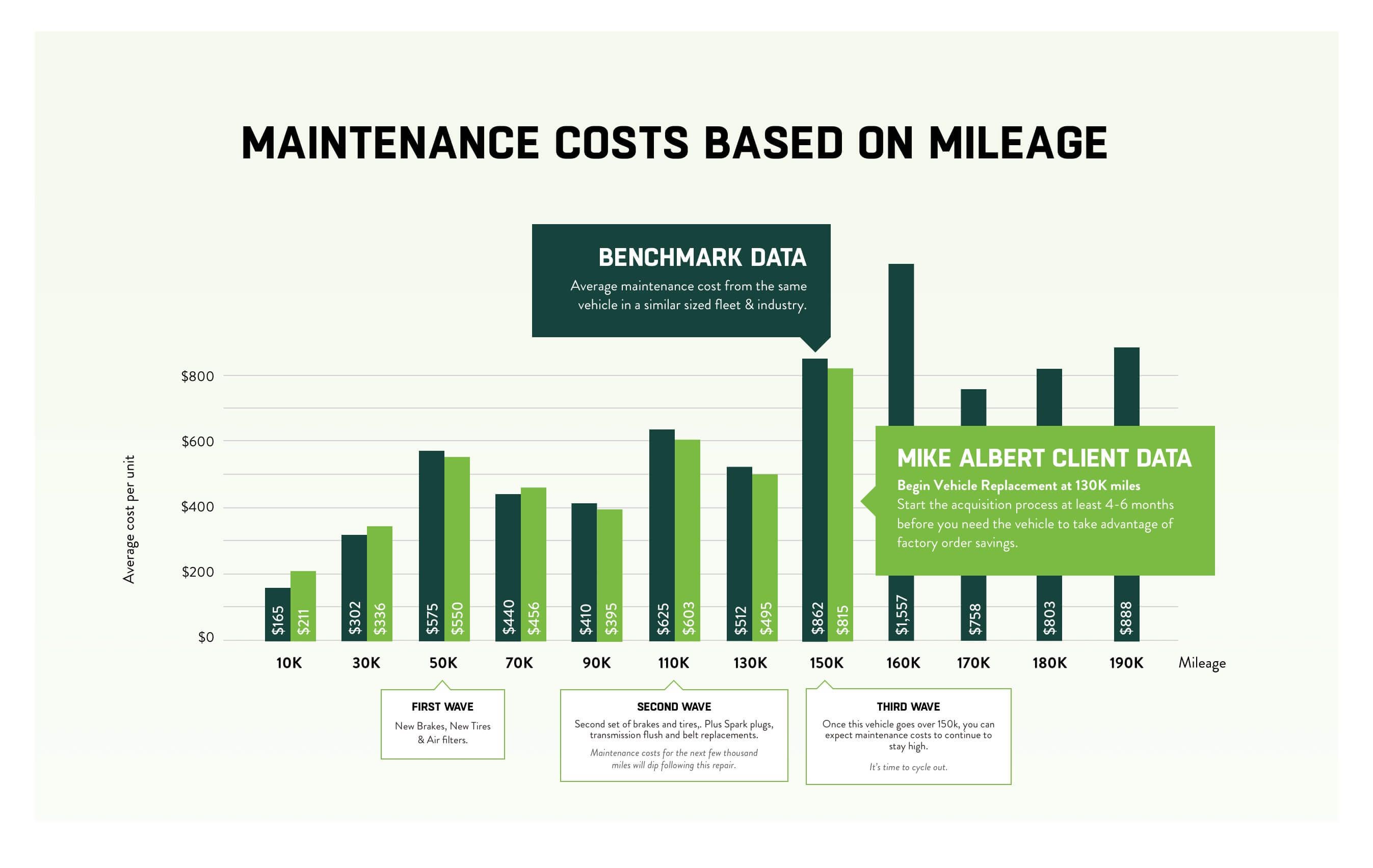From vehicle maintenance to vehicle life cycle strategies, fleet management can be exhausting and expensive—especially for owners of large fleets. In fact, fleet operations are typically one of the top five biggest expenses for businesses.
If your company started with ten trucks and now has one thousand, or started with one thousand and now has five thousand, but you’re still managing your fleet the same way, you may be hurting your bottom line.
Cost savings lie in tracking your fleet’s data and making informed, data-driven decisions with the help of the right fleet management company (FMC). Data tells a story about your fleet. And when you work with an FMC that has proven experience revealing that story and is driven to help you achieve your goals, they can provide the actionable insights you need to reduce your fleet operating expenses.
Data management challenges—organization and complexity.
You don’t know where to begin.
Maybe you do have some data, but maintenance expenses are in a spreadsheet owned by your finance manager. Your COO has the vehicle acquisition contracts filed in her office. Fuel receipts and reimbursement records only exist in hard copy form.
Difficulty gathering data is likely a top reason why you might not monitor it. On top of all your other responsibilities for your business (along with a staff that’s already stretched thin) you probably don’t have time to dig into your fleet data.
“Some fleet owners lack the capacity to keep tabs on their expenses,” says Chris Knosp, vice president of business development at Mike Albert. “When we ask some fleet owners about their fuel and maintenance expenses from the last year, they say things like, ‘I can probably get it, but it would take forever. It’s not itemized or anything.’”
It's in your best interest to set up a centralized system that collects certain data from your fleet, such as fuel receipts, mileage intervals, and service invoices. This practice will show you what each vehicle costs to operate and will provide a platform for the analysis required to make data-driven decisions.
You’re unsure of how to interpret it.
So once you establish a system of collecting fleet invoices and mileages in a centralized location, then what?
“Digging into your data takes resources,” says Nathan Niese, director of national client partnerships at Mike Albert. “You need an experienced analyst to look at your data, compare it against similar businesses, and pinpoint the actionable insights that are the most valuable for your fleet.”
Operating and administering a fleet doesn’t necessarily require being an expert at all things fleet. You can optimize your fleet operations by tapping into the knowledge of experienced fleet pros. With their help, you can walk away with impactful strategies from insights fueled by the latest, most relevant data that can enhance your fleet's success.
Why opt for data-driven decision making?
1. Maximize productivity and safety.
Ignoring small issues related to your fleet can have detrimental effects to your bottom line. For example, a lack of diligence in tracking vital oil changes can lead to a major breakdown. Frequent brake replacements can leave you blind to dangerous driving conditions or behavior.
Monitoring mileage, vehicle repairs and overall vehicle health are key to preventing catastrophic mechanical failures. Collisions and breakdowns can cause a major loss in productivity. Some sources estimate vehicle downtime costs between $488 to $760 per vehicle, per day.
And that doesn’t even include the added issues related to safety. Transparency to data can maximize the safety of your drivers, your passengers, and individuals in your vehicles’ paths. If one of your drivers is injured on the job—especially if it’s something that could have been prevented—your organization could be involved in legal entanglements costing even more time and money.
“You need to ensure your drivers are safe on the road not just for their own well being, but also to limit your liability,” said Knosp. “Data and interpretation can mitigate that risk across your entire organization.”
2. Control vehicle costs.
A sound vehicle life cycle strategy means replacing your aging vehicles before their maintenance expenses exceed their value.
While conventional thinking is to cycle out vehicles once they hit a certain mileage, it’s not that simple. Depending on makes, models and business use, some vehicles can last longer than others, determining the most profitable time to cycle out certain vehicles for new ones. But this is something you wouldn’t know without the proper data.
“Data helps you with the timing on when to cycle out vehicles,” said Knosp. “This includes making decisions based on past maintenance issues or if there is a recall that the fleet owner doesn’t know about. Data is vital to the conversation about replacing old assets with new ones.”
3. Gain a competitive edge.
Data will offer you more clarity into how you stack up against competitors.
“It’s safe to assume everyone in your industry is competitive,” said Knosp. “You have to assume everyone is doing strategic planning.”
Additionally, when you use data to cycle out your older vehicles at the right time, your competition’s vehicles will pale in comparison to your freshly updated fleet—giving your brand a better image. Finally, the money you save from data means more capital in your bank account and, therefore, more money to invest in business improvements.
The process behind data-driven decisions.
Here’s how an ideal fleet management partner will use your data for better decision-making.
1. Data collection. The FMC collects your data. If your fleet hasn’t tracked data or the data is unusable, the FMC uses assumptive data based on similar clients or similar fleet profiles.
2. Comparison to benchmark data. Next, the FMC will compare your data to their industry-specific benchmark data. They’ll pull it together in a way that’s easy to see where you might be overspending.

3. Presenting actionable solutions. An attentive FMC will figure out exactly which levers to pull to identify opportunities within the fleet that can impact overall company goals and objectives. For example, you may be able to swap a gas-guzzling SUV for a sedan, or you may be on the verge of a breakdown in a high-mileage cargo van. A FMC’s solutions can help you identify potential for operational changes that will ultimately save you time and money.
4. Strategic partnership. A dedicated strategic partner at the FMC should proactively communicate with you. Rely on their expertise to guide you through timing and solution implementation. Then throughout your relationship, the strategic partner will regularly provide insights on industry trends and analysis of your fleet data. Annual reviews will ensure your fleet operations continue to align with your business goals.
5. Let the strategy speak for itself. With confidence in your fleet, you can focus on your other core business responsibilities. Plus, with your newfound savings, you can invest in new technology, talent, or other business needs.
What to look for in a fleet management partner.
Dedication to a diverse range of fleets.
An ideal FMC will be able to pull from their work with prior clients across a diverse range of industries, fleet sizes and vehicle types. This, along with comparison to industry benchmarks, will help inform the best solutions for your fleet.
“While one of our goals is to get data, many organizations just don’t have it. It’s hard to slow down and dedicate the time to data,” said Knosp. “So we often try to prove it through assumptive modeling. Based on your business profile, industry and our experience, we think this is the best solution.”
No matter the size of your fleet, you should opt for a partner that offers nimble, flexible, white glove services and doesn’t hesitate to give your fleet the attention it deserves.
In-house capabilities.
A reliable FMC will have a client portal platform where the data is housed so you don’t have to sort through filing cabinets or track down various team members to get the data you need. Instead, it will all live in one central, digital repository.
As an added bonus, some FMCs might also have a proprietary tool that will interpret data, thus improving the safety and productivity of your drivers and vehicles.
“There are tools that can provide the data and insights in an actionable way,” said Niese. “At Mike Albert, our proprietary solution Albert IQ can help us make decisions on what’s important and what’s not.”
Real experts, real solutions.
It’s possible that your account manager at your current FMC could be underserving you, allocating most of their time and attention to fleets that are the most profitable for them.
“There’s only so much time and attention some account managers can give, and in some cases, their focus is on the largest fleets,” said Niese. “The companies with 100-unit fleets then become underserved from a data/insight standpoint.”
Be wary of FMCs that preach a self-help type of environment. A client-obsessed FMC will treat your fleet like it’s its own. The account managers will commit to bringing your data to life so you can see where you’re doing well and where you could be doing better.
“People can self-serve data all day long,” said Knosp. “But unless you have the help of someone who knows how to interpret it in ways that benefit your specific fleet needs, chances are you’re going to be lost.”
Your fleet management partner should provide you with a client-focused fleet expert who will work with you one-on-one—providing personal, attentive, responsive service and proactive support for the life of your fleet.
Want to take a look at your data and talk to real fleet experts with real fleet solutions? Set up a free fleet consultation today.
Skills covered in the class
Operational Efficiency
Data-Driven Decision Making
Financial Management
Optimal Vehicle Health
Did you enjoy this class?
Share it with your organization and colleagues.



